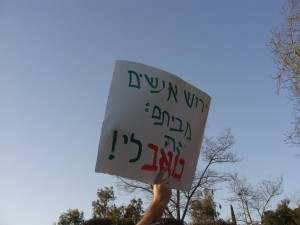
The Huffington Post, February 2, 2010
Maan News Agency, February 2, 2010
Despite police plans to end the demonstration with force, more than 300 Palestinians, internationals, and Israeli activists gathered in Sheikh Jarrah on Friday afternoon to protest the evictions of Palestinian families from their homes.
Armed with only drums and handwritten signs that read “Free Sheikh Jarrah” and “People before territory”, the demonstrators stood across the street from about 50 police clad in full riot gear. The tension was palpable as the two groups squared off. When police and protesters clashed in December, 21 demonstrators were detained. In January, dozens of protestors were arrested, including the director of the Association for Civil Rights in Israel, Hagai El-Ad. Haaretz reports that more than 70 demonstrators have been arrested to date.
Although Israeli police seem intent to squash free speech, the legal system has sided with the protestors. Last month, a Jerusalem judge deemed the activists’ arrests illegal. And the same court ruled that the demonstrations are within the boundaries of the law. Speaking to the Israeli daily Haaretz, attorney Michel Sfrard, who represented the detained activists, said the court’s ruling was a “major victory.”
On Friday, one protestor joyously waved a photocopy of a Hebrew-language article announcing the judge’s decision. Standing with the tight group of demonstrators, Knesset Member Hanna Swaid of the Hadash party remarked, “Police tried to stop the protests, but the Israeli court ruled this is a legal demonstration.”
Supporting the Palestinians of East Jerusalem is important, Swaid said, as an increasingly severe government encourages Jews to take over Arab homes and land. In Sheikh Jarrah, Palestinian families have been left homeless after they have been evicted by force from their houses, which have then been handed over to settlers. And the organization Nahalat Shimon International intends to demolish the neighborhood in order to build a large settlement in its place.
Observers are increasingly looking at the protest as a way to check the pulse of the Israeli left. Some say the weekly demonstration—which is made up, primarily, of Israelis—indicates that the left is on the verge of a revival; others disagree.
Swaid commented, “The Israeli left was waiting, unfortunately, for a very long time for the resumption of peace talks. This will not happen under this government. The left has to take to the streets to exert pressure and show that there is a great part of Israeli society that doesn’t support the policies of Judaization, settlers, and occupation.”
The heavy police presence, he added, “only increases the willingness of people to come and show sympathy for the Palestinians.”
Neria Biala, 35, is a new activist. At the urging of a friend, she attended a West Bank demonstration several months ago and was shocked by what she saw there. “What struck me the most was the violence—the army and the police were extremely violent,” she recalled.
Biala then embarked on a journey of re-education. Now, with a new understanding of the conflict between the Israelis and Palestinians, she sees Sheikh Jarrah as a microcosm for the Jewish state’s ills. And, in light of the recent arrests, Biala sees participating in the protest a step towards safeguarding Israeli democracy.
Israelis who are uninformed and uninvolved are harming their own country, she said. “It’s suicide not to know what’s going on here.”
Oshra Bar, 22, is less concerned with Israeli democracy. Why? According to Bar, a longtime activist who refused mandatory service in the Israeli army, it doesn’t exist.
“It’s impossible to have a democratic state when you have race laws.” Bar pointed to West Bank roads that are Jewish-only and restrictions on the sale of land to Palestinians as examples.
“What is happening here [in Sheikh Jarrah] is a direct continuation of the Palestinian Nakba—the people [Arabs] are being dispossessed again,” Bar said, adding that she believes in a secular, bi-national state with equal rights for all citizens. “I’m here to show that I’m against race laws.”
She looked then towards the police. Her chin down and her dark eyes raised Bar said defiantly, “I’m not afraid to be arrested.”